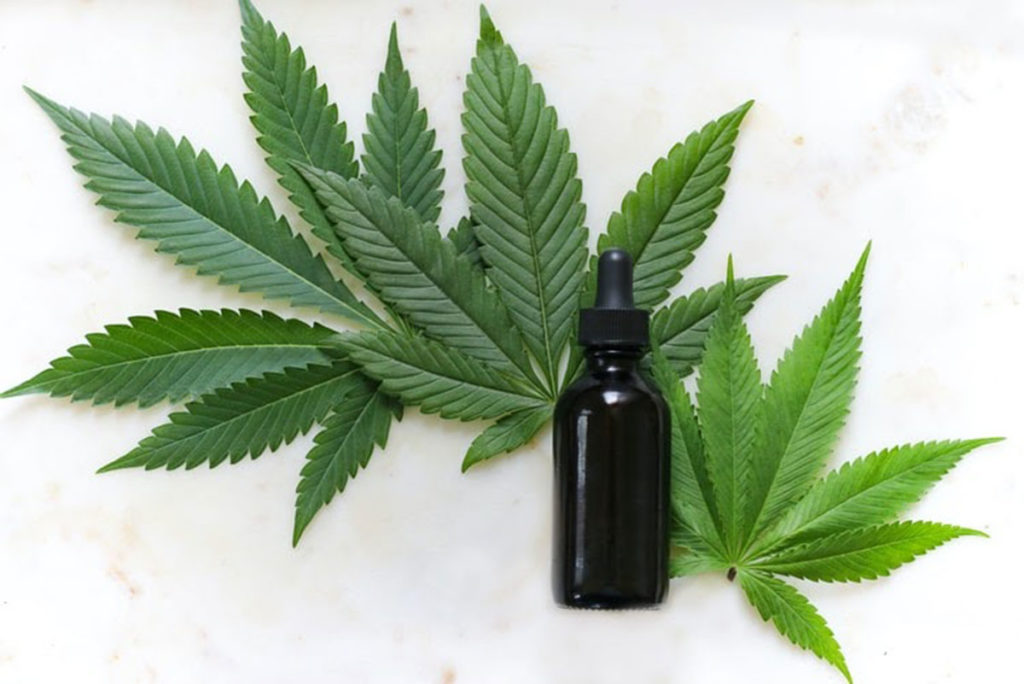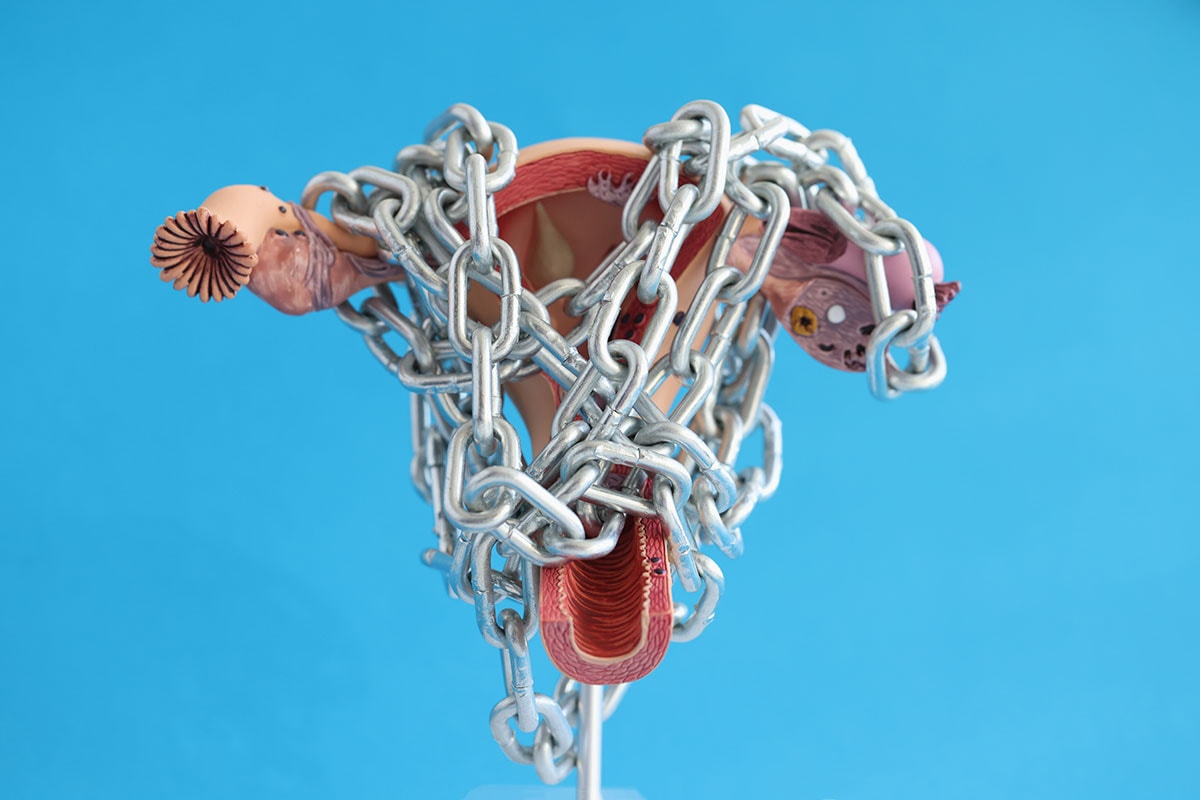Uterine fibroids are the most common benign female tumour, affecting 25% of all women. Can you use CBD oil for fibroids?
For most women these are completely painless, however for a significant few, it is a different story. This blog post gives you the low down on using CBD oil for fibroid pain.
Keep reading!
What are fibroids
Fibroids are non-cancerous tumors that grow out of the womb and into surrounding tissues. They’re sometimes called ‘leiomyomas’ when they’re in the uterus, or ‘myomas’ when they’re in other parts of the pelvic area. Fibroids grow slowly over time, but some women notice that their symptoms worsen quickly after childbirth or miscarriage. In this case, it’s possible that a sudden change in hormone levels caused by the event triggered a new fibroid
Despite the name, they aren’t actually tumours in the scientific sense. They don’t invade or damage nearby tissue and they can’t spread elsewhere in the body like cancerous tumours do.
What causes fibroids?
The cause of fibroids is still unknown, but doctors have discovered some factors that may contribute:
Genetics: Some women are more likely to develop fibroids because of their genes. A woman with a family history is more likely to develop them herself.
Hormones: Fibroids are influenced by the hormones estrogen and progesterone. When a woman’s body produces or contains too much of these hormones, it can increase the risk of developing fibroids. Conditions that can cause this include: anorexia nervosa, estrogen-producing tumours, being pregnant and certain drugs such as contraceptives or hormone replacement therapy.
Other growth factors: Other growth factors that may play a role in the development of uterine fibroids include: insulin-like growth factor (IGF-1), which is a hormone that stimulates cell growth and division; and prolactin, a hormone produced by the pituitary gland that stimulates breast milk production.
Extracellular matrix (ECM): Fibroids may also develop when the ECM, which is the material that surrounds cells in the body, becomes too thick. The ECM helps to control how cells grow and divide. When it becomes too thick, it can lead to an increased risk of developing uterine fibroids.
There is still much research to be done on the cause of uterine fibroids, but scientists are making good progress. More information about the factors that contribute will help improve diagnosis and treatment options for women who suffering from this condition.
How do fibroids affect your body?
If you have fibroids, it’s important to be aware of how they can affect your body and seek treatment if needed.
Fibroids can cause pain in the lower abdomen and back, as well as during intercourse. They can also lead to heavy menstrual bleeding, which can cause anaemia. In some cases, fibroids can block the fallopian tubes or interfere with implantation of a fertilized egg, leading to infertility. They may also increase the risk of miscarriage.
Fibroids are not cancerous, but they do tend to grow, or become more noticeable, as women get older. Up to 25 percent of all women have uterine fibroids at some point during their childbearing years.
Fibroid symptoms
Symptoms of fibroid tumours include:
Heavy vaginal bleeding: Sometimes women with fibroids experience period pain with a heavy flow during their time of the month. The bleeding may be so heavy that it leads to anemia.
Pelvic discomfort: Many women with fibroids have a sense of pelvic pressure or fullness. Fibroids can also cause pain, either constant or intermittent, in the lower abdomen and pelvis.
Pelvic pain: Some women experience pain during sex or when they urinate or have a bowel movement because the fibroids are pressing on nearby organs.
Bladder problems: Women with fibroids may find that they need to urinate more frequently or urgently than usual. They may also have trouble completely emptying their bladder.
Low back pain: Sometimes the large size of a fibroid will put pressure on the spine and cause lower back pain.
Rectal pressure: Sometimes a large fibroid can lead to rectal bleeding, constipation or difficulty in passing stool.
It’s important to remember that not all women with fibroids have these symptoms and that having any of these symptoms doesn’t mean you definitely have fibroids. If you’re experiencing any of these problems, be sure to see your doctor for a diagnosis.
What is CBD?
CBD stands for Cannabidiol. It’s one of more than 120 compounds found in cannabis that belong to a class of molecules called cannabinoids. The second most abundant of the cannabinoids, CBD is responsible for pot’s healing properties.
Most CBD comes from hemp plants that contain high concentrations of CBD and very little THC.
THC and CBD are both cannabinoids, but they have very different effects on the human body. THC is psychoactive and causes the “high” associated with marijuana use. CBD does not have any psychoactive effects and is not addictive.
CBD has been shown to help with a wide range of medical conditions, including chronic pain, anxiety, seizures, and more.
How CBD oil help fibroid sufferers
CBD oil is a natural remedy that can help reduce pain associated with fibroids in many different ways. One of these is through pain management. The levels of serotonin in our brains work to decrease the amount of pain we feel. This may be why people who take cannabis oil for fibroid pain often report decreased pain levels and increased relaxation. CBD has also been shown to help reduce inflammation which is often associated with fibroids. It does this by binding to COX-2 receptors which, when unbalanced, cause inflammation and other responses related to chronic conditions.
How to take CBD oil for fibroids
CBD oil can be used topically, orally, or inhaled, and it can provide relief from a wide range of symptoms. Some of the ways you can use CBD oil for fibroids include:
1. Use CBD suppositories:
If you can deal with a little mess, try using CBD suppositories. They are designed to deliver the full medical benefits of CBD oil to your body in a very targeted way. Since they go directly where the pain is, you’ll get fast relief that lasts for hours. They’re also great if you have a cold or allergies and want to avoid taking pills or eating something that may not agree with you.
2. Try a topical rub:
If you don’t want to take anything orally or if you’re experiencing pain in a specific area, try using a topical CBD rub. It will be absorbed through your skin and provide localized relief.
3. Vape CBD oil:
If you need quick pain relief, vaping CBD oil is a great option. The effects are almost immediate, and it can help to reduce inflammation and ease pain.
4. Choose an oil:
CBD oils come in different strengths and consist of CBD in a carrier oil – normally hemp seed or coconut oil (MCT). The effects last 6-8 hours so this is the best method for 24 hour relief.

5. Take edibles:
Edibles can take a little longer to work than other methods, but they are an excellent option if you’re looking for relief that lasts.
6. Reach out to your doctor:
Even though CBD oil is safe to use, it’s always a good idea to talk with your doctor before using any new medication or supplement. They should be able to advise you on what type of CBD oil will provide the best relief based on your symptoms and medical history. If you have any negative side effects after you start taking CBD, they can help figure out what’s going wrong and make adjustments to your dosage or treatment plan.
Possible side effects of using CBD oil for fibroid pain
In general, CBD oil is a very safe product to use for fibroid pain. The following are the most common side effects that have been reported:
- Dry mouth
- Diarrhea
- Reduced appetite
- Drowsiness
CBD oil may also interact with other medications that you are taking. Be sure to talk to your doctor before using CBD oil if you are taking any other prescription or over-the-counter medications.
Benefits of using CBD for fibroid pain relief
CBD oil helps alleviate pain, lower inflammation and relax muscles in areas affected by fibroids with little impairment or side effects.
CBD is non-addictive, unlike prescription painkillers that can be dangerous when used long term. It is a great option for those who are looking to find relief from the pain and discomfort that comes with fibroids. It can also be a great way to reduce or eradicate opioids from your regime if you are currently using them for pain management.
So if you are looking for a more natural solution to help relieve your fibroid-related pain, CBD may be the right option for you.
Why use natural remedies like CBD instead of prescription drugs or surgery?
Many people are turning to natural remedies instead of medication or surgery. This is because the side effects are less, plus you probably won’t have to go through as many doctor’s appointments with your physician.
The most straightforward reason why CBD is better than prescription drugs and surgery is that it gets you what you need without the risks. It has few side effects and it’s not addictive like pain medication or anti-anxiety meds that some people take on a regular basis.
How to manage pain from a fibroid without medications
If you’re experiencing pain from a fibroid, here are a few ways to manage it without medications:
1. Try using a heating pad or hot water bottle to soothe the pain.
2. Take over-the-counter painkillers like ibuprofen or acetaminophen.
3. Get regular exercise to help reduce the symptoms.
4. Practice relaxation techniques like yoga or meditation to help ease the pain.
5. See a doctor if the pain doesn’t improve after trying these methods.
Conclusion
Although more research needs to be done, there is some evidence that CBD could be useful for treating uterine fibroid pain. It is shown to reduce inflammation, it’s safe and doesn’t have the nasty side effects of opioids. In fact, it can actually help people get off their opioid painkillers.
If you’re suffering with this painful condition or are having trouble managing your chronic pain without resorting to addictive opioids like oxycontin (or even worse heroin) why not give CBD a try?
If you or a loved one have tried CBD for fibroids, get in touch, we’d love to hear from you and share your story!
FAQs
Is there anything else I should know about the benefits or side effects of using CBD oils to treat my fibroids?
There are a few key things to know about CBD oil and fibroids. First, CBD oil can help to reduce inflammation and pain. This makes them a great option for treating fibroids. Additionally, CBD oil can help to improve mood and anxiety levels. This is essential because stress can aggravate fibroids. However, it’s important to note that more research is needed on the potential side effects of using CBD oil to treat fibroids.
Is CBD oil legal?
CBD oil is legal in most countries in Europe, but not all. It is important to check the laws in your state to make sure that you are using CBD oil legally.

How much CBD oil should I take for fibroid pain?
It’s difficult to know the exact dosage of CBD oil that you should take for fibroid pain as it varies widely from person to person. Doses can be anywhere from 2.5 mg up to 300mg per day.
The right dose will depend on your body weight, the severity of your pain, and your general physiology. The best thing to do is to start low, with just a few drops or doses a day and work up slowly.
It can take up to a week or two to feel the effects, so be patient. Stick with it and give it time to work. It works more slowly than opioids because it is gentler on your system.
READ MORE







